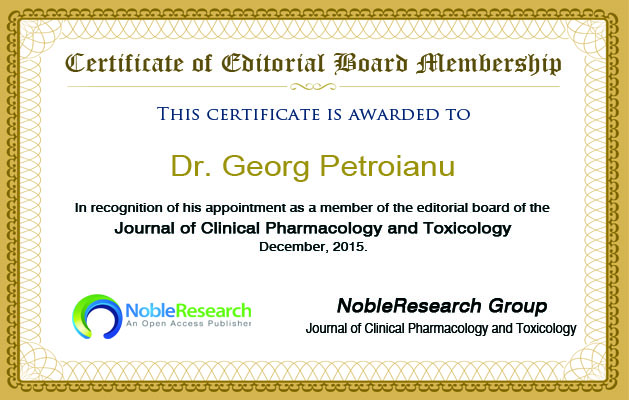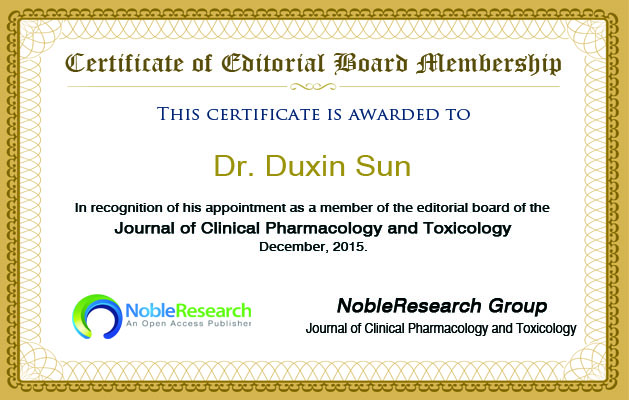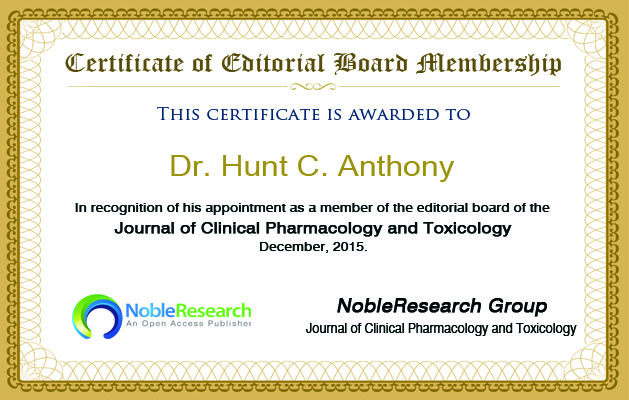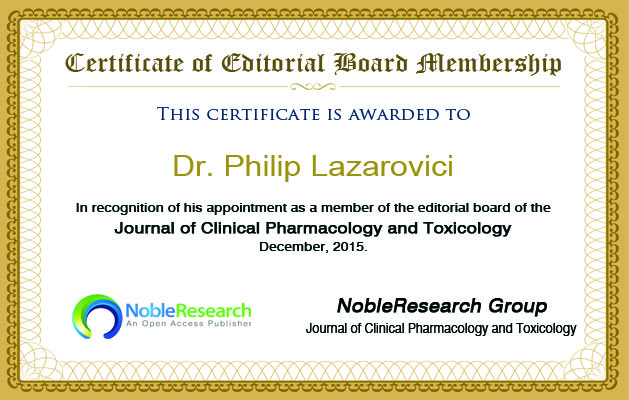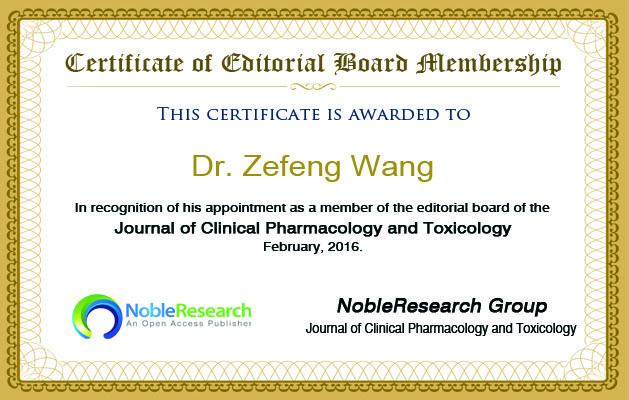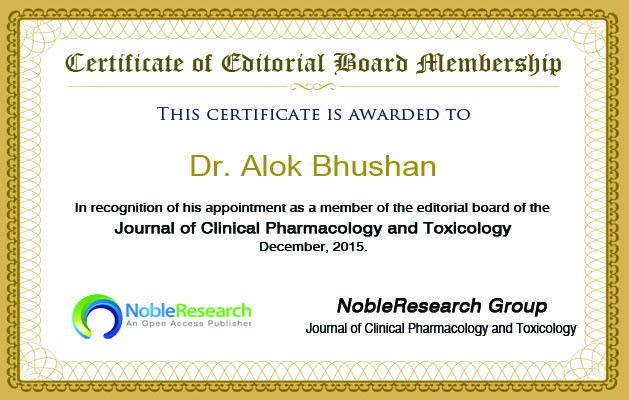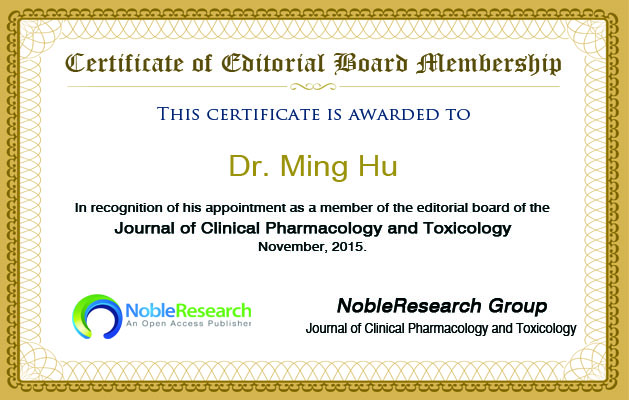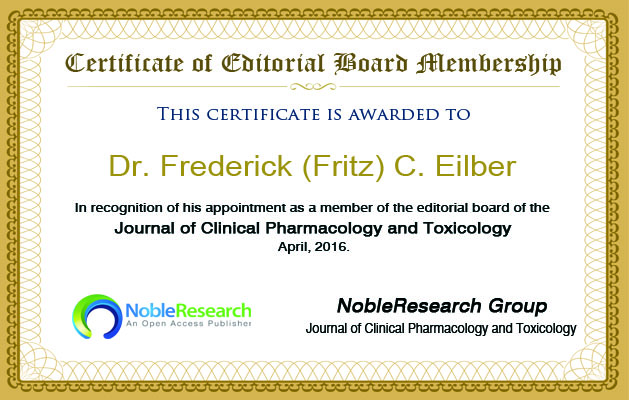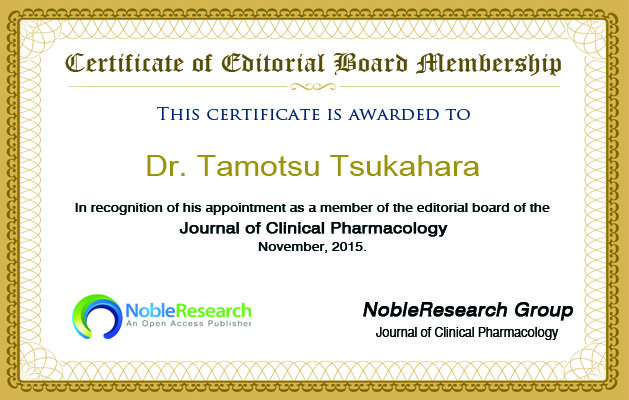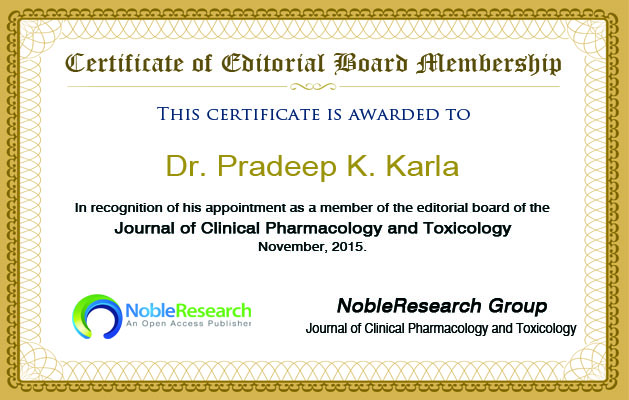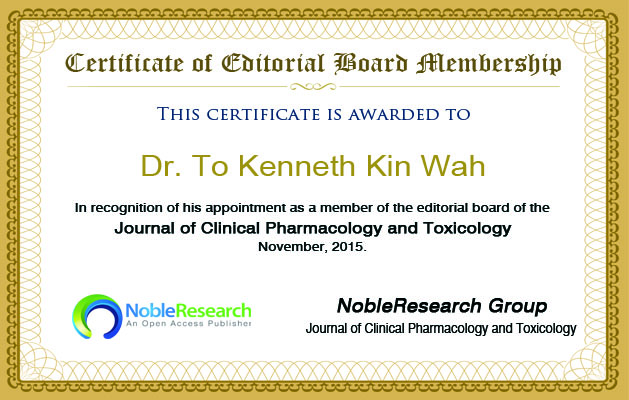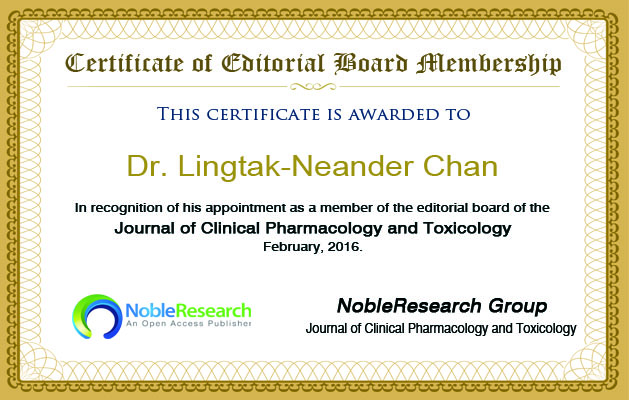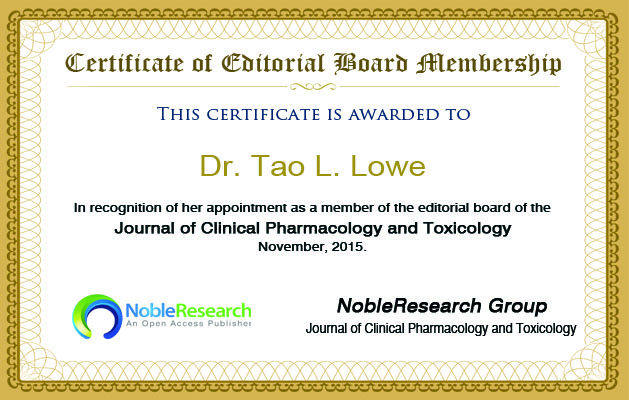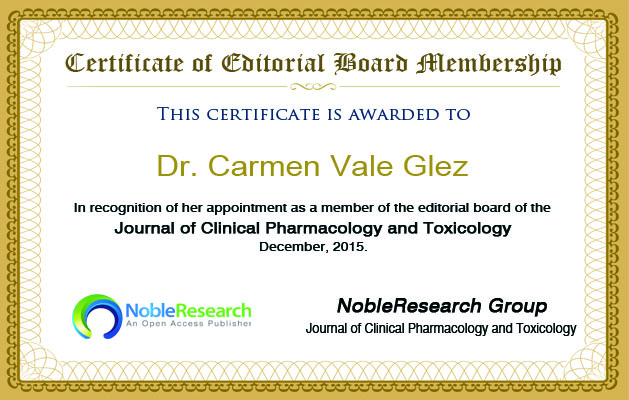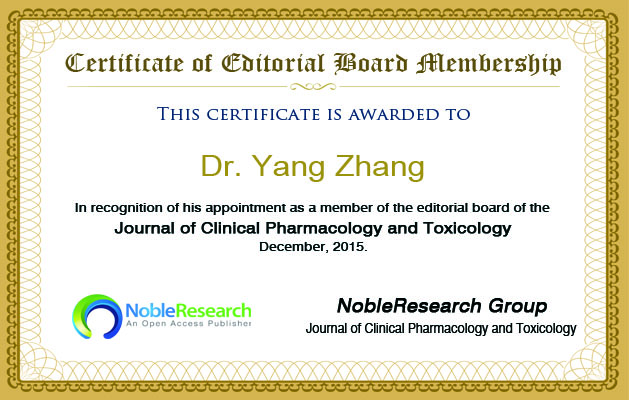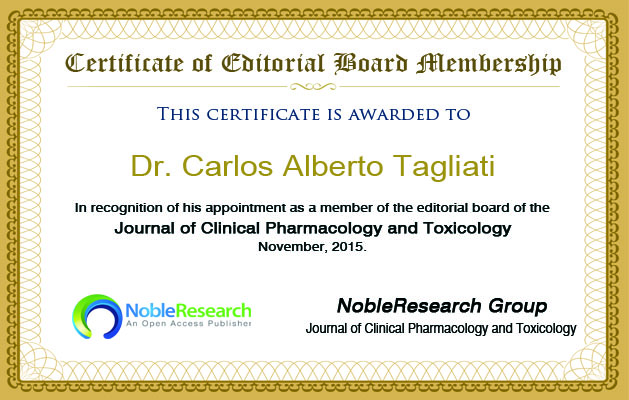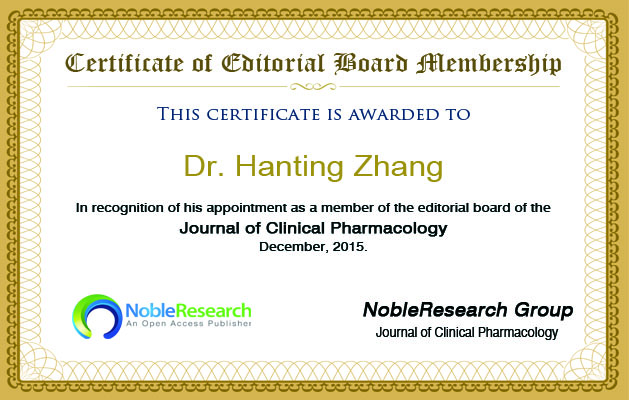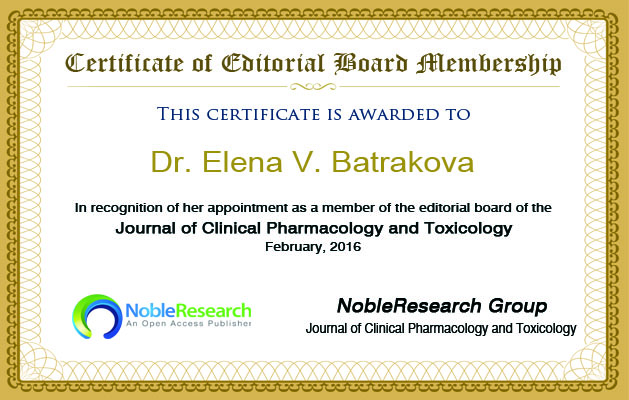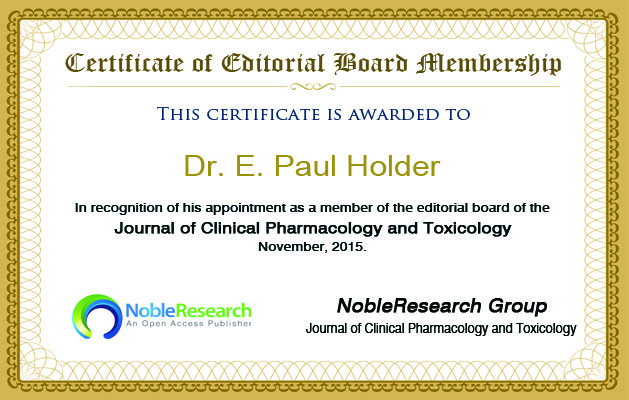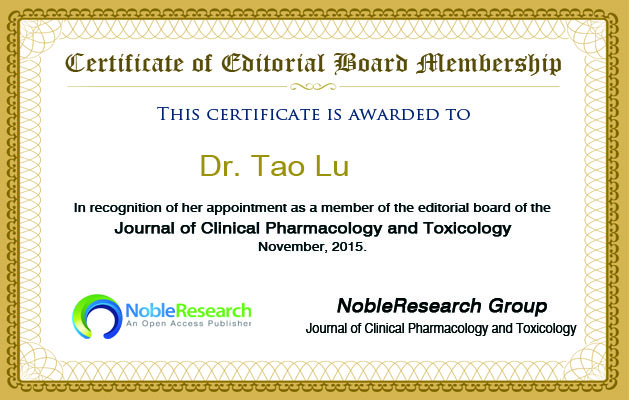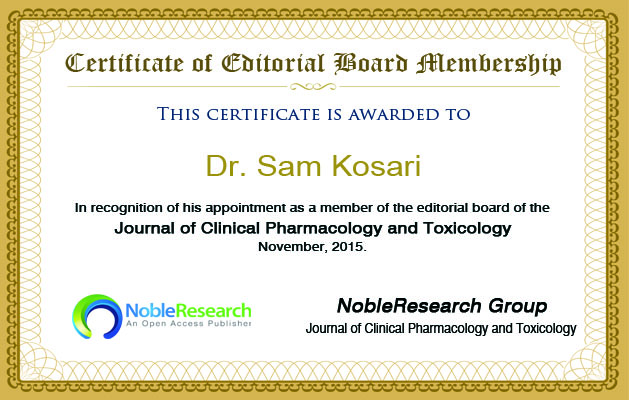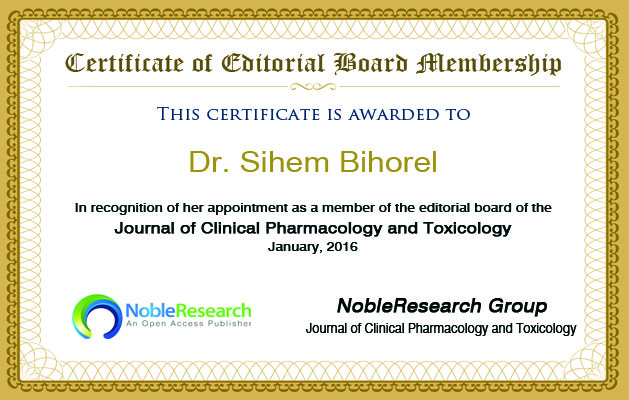
The email alerts service allows anyone who registers their email address to be notified via email when new content goes online.
Recommend this journal to your friend or library.
Manuscripts should be submitted online through our website or as an email attachment to the editorial office at editor.jcpt@nobleresearch.org
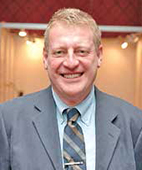
- Dr. Georg Petroianu,
- Professor and Founding Chair,
- Department of Cellular Biology & Pharmacology,
- Herbert Wertheim College of Medicine,
- Modesto A. Maidique Campus,
- Miami, Florida 33199,
- USA.
- BiographyOpen or Close
Professor Petroianu serves as Chairman of the Department of Cellular Biology and Associate Dean for Clinical Research in the Herbert Wertheim College of Medicine at Florida International University (FIU). He has been on exam committees and written several Q&A books for residents preparing for certification exams. Dr. Petroianu has received multiple teaching awards, including numerous Best Lecturer Awards at University of Heidelberg at Mannheim and the Excellence in Teaching Award at the United Arab Emirates University and Professor of the Year at FIU. Dr. Petroianu received his PhD, MD and Habilitation from the University of Heidelberg at Mannheim. He has worked in Anesthesiology and Emergency Medicine and has board certifications in Pharmacology and Toxicology (Germany) and Clinical Pharmacology (American Board of Clinical Pharmacology). He is a Diplomat of the American Academy of Pain Management. In 2002, he became Chair of the Department of Pharmacology and Therapeutics at the United Arab Emirates University. Dr. Petroianu has authored more than 165 peer-reviewed research papers, 60 other non-abstracted publications and several books. In 2014, he was recognized as a leading pharmacology educator when he was inducted into the prestigious Academy of Pharmacology Educators of the American Society for Pharmacology and Experimental Therapeutics.
- ExpertiseOpen or Close
Professor Petroianu most recent research is on cholinesterase protection and reactivation in relation to organophosphate exposure. For his contribution to Pharmacology, Dr. Petroianu was awarded the Issekutz Medal of the Hungarian Society of Pharmacology and Toxicology and received an Honorary Doctoral Degree from the Semmelweis University in Budapest.
- CertificateOpen or Close
- PublicationsOpen or Close
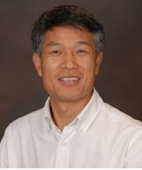
- Dr. Duxin Sun,
- Professor of Pharmaceutical Sciences,
- William I. Higuchi Collegiate Professor,
- Department of Pharmaceutical Sciences,
- College of Pharmacy,
- The University of Michigan,
- 428 Church Street, Ann Arbor,
- MI 48109, USA.
- BiographyOpen or Close
"Dr. Duxin Sun is a Professor in the Department of Pharmaceutical Sciences and William I. Higuchi Collegiate Professor in the College of Pharmacy at the University of Michigan. Dr. Sun earned his Ph.D. in Pharmaceutical Sciences in the College of Pharmacy, University of Michigan, Ann Arbor, Michigan. He did his Bachelor of Pharmacy in School of Pharmacy, Second Military Medical University, Shanghai, China (1982-1986). He completed his Master of Pharmacology in School of Pharmacy, Second Military Medical University, Shanghai, China (1989-1992). Dr. Sun serves as the Director of Pharmacokinetics (PK) Core. Dr. Sun also has joint appointment in the Chemical Biology program, the Interdisciplinary Medicinal Chemistry program, and University of Michigan’s Comprehensive Cancer Center. He has published more than 130 papers, 85 meeting abstracts, 9 book chapters, and 12 U.S. patents. Dr. Sun has supervised 27 PhD students and 40 postdoctoral fellows and visiting scientists. Dr. Sun has served as chair of the PPB (Physical Pharmacy and Biopharmaceutics) section in AAPS (American Association of Pharmaceutical Scientists),Vice president of the American Chinese Pharmaceutical Association (ACPA). Dr. Sun has served on study sections for NIH, FDA, Cancer Research UK, French National Research Agency, and Italian Ministry of Health. "
- ExpertiseOpen or Close
Dr. Sun’s research interests focus on drug discovery to inhibit cancer stem cells and nanomedicine for cancer therapeutics and imaging. His research has made significant contributions to develop small molecules to inhibit novel cancer stem cell targets to prevent tumor formation and metastasis. He also developed a nanotheranostics, which incorporates therapeutic agent and imaging probe into one nanoparticle, for cancer therapy and tumor imaging. His group is also interested on direct measurement and computation modeling of drug dissolution in human GI tract to ensure BE and product quality for modified release (MR) and locally acting drugs.
- CertificateOpen or Close
- PublicationsOpen or Close

- Dr. Hunt C. Anthony,
- Professor,
- Department of Bioengineering and Therapeutic Sciences,
- The University of California, San Franscisco,
- 513 Parnassus Ave,
- UCSF Box 0912,
- San Francisco, CA 94143,
- USA.
- BiographyOpen or Close
Dr. Hunt C. Anthony is Professor in the Department of Bioengineering and Therapeutic Sciences, Schools of Medicine and Pharmacy, University of California, San Franscisco (UCSF), USA. He earned his Ph.D in Pharmaceutical Chemistry from the University of Florida, Gainesville, FL, in 1977. He completed his BS in Chemistry from Georgia Institute of Technology, Atlanta, GA, in 1968. Dr. Anthony is a participant in four of the MSM Consortium Working Groups; a member of the Scientific Advisory Council to the Committee on Credible Practice of Modeling & Simulation in Healthcare. He is an AAAS and AAPS Fellow and a Director of the McLeod Modeling and Simulation Network. Since 2000, he has served on three Scientific Advisory Boards. Prior to that he was Director of UCSF’s, Biotechnology Training Program. His wet-lab and biotechnology background has contributed to development of a somewhat unique approach to multiscale modeling and simulation. Earlier, he had a successful track record inventing and developing novel therapeutics, targeted delivery, and siRNA methods. Five of 11 US patents resulting from that work has earned UC income; three have earned UC net income.
- ExpertiseOpen or Close
Dr. Hunt C. Anthony’s current focus includes morphogenesis and wound healing; the coupled influences of inter-, intracellular, and zonal tissue heterogeneity on transport, metabolism, and response to therapeutic (and potentially therapeutic) and toxic molecules in normal and diseased livers; and simulating how explanatory mechanisms change in vitro to in vivo (animal models) to humans. Dr. Anthony’s small group develops and uses advanced modeling and simulation methods to achieve deeper, actionable insight into the multilevel mechanisms responsible for biomedical phenomena, from cells in engineered environments to tissues and organs to populations of individuals, in the presence and absence of interventions. They also develop, challenge, and validate concrete, actionable theories of mechanistic translation among research, clinical, and drug development contexts.
- CertificateOpen or Close
- PublicationsOpen or Close
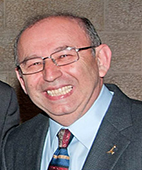
- Dr. Philip Lazarovici,
- Professor of Pharmacology,
- Jacob Gitlin Chair in Physiology,
- School of Pharmacy,
- Institute for Drug Research,
- The Hebrew University of Jerusalem,
- Ein-Karem, Jerusalem, 91120,
- Israel.
- BiographyOpen or Close
Dr. Lazarovici Philip, Jacob Gitlin chair in Physiology and Professor of Pharmacology at The Hebrew University of Jerusalem, is a member of the Institute for Drug Research of the School of Pharmacy. Professor Lazarovici graduated in pharmacology and toxicology at the Hebrew University, post graduated on neurobiology at the Weizmann Institute of Science and conducted neurochemical and molecular research at the National Institutes of Child Health and Human Development, NIH, Bethesda, USA as a visiting scientist, which all set the stage for his lifelong career on pharmacology in Israel. He was a visiting professor in the School of Biomedical Engineering, Science and Health Systems, Drexel University and Faculty of Engineering, Department of Bioengineering, Temple University, Philadelphia, USA. His groundbreaking work provided Israeli pharmacology and clinical pharmacology community with neuronal models, lead compounds and technologies towards development of different neurological drugs and elucidation of their mechanism of action. Prof. Lazarovici is a member of 15 international and national academic societies, published about 200 scientific articles and reviews and edited six books in his field of research.
- ExpertiseOpen or Close
Dr. Lazarovici Philip research interest includes Development of an anti-metastatic, peptidomimetic drug based on alpha1/alpha2 integrin receptor inhibition. Investigations of tissue engineered scaffolds containing human umbilical cord blood stem cells for therapy of neurological disorders. Development of in vitro colon cancer models for near infrared imaging. Characterization in vitro and in vivo of novel angiogenic functions of nerve growth factor (NGF). The role of NGF in muscle degeneration. Isolation and characterization of anti-cancer and anti-angiogenic lead compounds from snake venoms. cancer, anti-metastatic drug, integrin receptors, disintegrin, peptidomimetic technology, glioma, pheochromocytoma, melanoma, PC12, GFP-PC12, neuronal progenitors, tissue engineered scaffolds, neurodegenerative diseases, neuroprotection, ischemia, brain trauma, neurotoxicity PC12 model, nerve growth factor (NGF), K252a, neurotrophins, differentiation, muscle regeneration, myoprotection, angiogenesis, neurovascular unit, angiogenic factors, Near infrared imaging technology-based drug discovery, preclinical assessments, in vitro and in vivo model systems.
- CertificateOpen or Close
- PublicationsOpen or Close
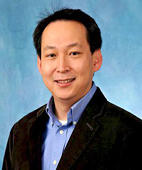
- Dr. Zefeng Wang,
- Professor and Director,
- CAS-MPG Partner Institute for Computational Biology,
- Chinese Academy of Sciences,
- 320 Yue Yang Road,
- Shanghai, China.
- BiographyOpen or Close
Dr. Zefeng Wang is a principal investigator and director in the CAS-MPG Partner Institute for Computational Biology (PICB) at Shanghai. He received his bachelor degrees as double major in Biological Science and Computer Technology from Tsinghua University in Beijing. He received his PhD degree at Johns Hopkins Medical School at Baltimore, US, after which he worked a Damon Runyon fellow at Massachusetts Institute of Technology. He became an assistant professor at University of North Carolina at Chapel Hill in 2007 and was promoted as associate professor with tenure in 2013. In 2015, he moved his lab to Shanghai and became the director of the PICB, which is a partner institute jointly run by Chinese Academy of Science (CAS) and Max-Planck-Gesellschaft (MPG).
- ExpertiseOpen or Close
Dr. Wang’s research focuses on the regulation of gene expression in RNA level. He has made significant contribution to the filed of RNA biology by developing a series of genomic approaches to study RNA splicing and dysgradation in a systematic fashion. His lab have systematically identified splicing regulatory cis-elements and trans-factors, and further study how they interact to each other to control splicing in normal and disease conditions. In addition, he has pioneered the filed of engineering RNA binding proteins and developed artificial proteins to specifically manipulate RNA metabolism. He has published >40 research papers that were cited >3000 time, and his work was recognized by several research awards, including RNA Society/Scaringe Young Scientist Award, Alfred Sloan Research Fellow and Beckman Young Investigator.
- CertificateOpen or Close
- PublicationsOpen or Close
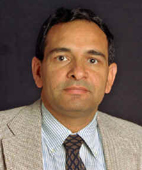
- Dr. Alok Bhushan,
- Professor and Chair,
- Departmentof Pharmaceutical Sciences,
- Jefferson School of Pharmacy,
- Thomas Jefferson University,
- 901 Walnut Street, Suite 915,
- Philadelphia PA 19107,
- USA.
- BiographyOpen or Close
Dr. Bhushan is Chair and Professor in Department of Pharmaceutical Sciences, Jefferson School of Pharmacy at Thomas Jefferson University in Philadelphia. Dr. Bhushan received his B. Sc. (Honors) and M. Sc. degree in chemistry from University of Delhi, India. He received his Ph.D. in Biochemistry from Punjab Agricultural University, India. He was a post-doctoral fellow at Johns Hopkins School of Medicine, Medical University of South Carolina and University of Vermont. He has held faculty positions at Department of Pharmacology, School of Medicine, University of Vermont and Department of Biomedical Pharmaceutical Sciences, College of Pharmacy, Idaho State University. He has over 15 years of experience in Pharmacy education. He has served as member of the Assessment Committee, Patent Committee, Honors Committee, ISU Biomedical Research Institute steering committee and Cultural Affairs Committee. He serves as an advisor to the Association of Graduate Students in Pharmacy and Association of Indian Students at Idaho State University. Dr. Bhushan served as coordinator of the graduate program in the Department of Pharmaceutical Sciences.
- ExpertiseOpen or Close
Dr. Bhushan’s areas of interest include cancer pharmacology and signal transduction focused on treatment and prevention. His research areas are 1) understanding mechanisms to block glioblastoma invasion in brain and synthesis of novel agents that target the process of invasion; 2) understanding the mechanism of the role of isoflavones in preventing breast and oral cancer; 3) characterization and cloning of a novel reduced folate transporter which plays role in methotrexate and cisplatin resistance; 4) natural drug discovery for prevention and treatment of cancer; and 5) Pharmacology of Nanomaterials.
- CertificateOpen or Close
- PublicationsOpen or Close
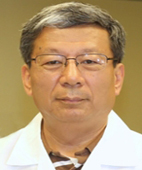
- Dr. Ming Hu,
- Professor of Pharmaceutics,
- University of Houston College of Pharmacy,
- 531 Texas Medical Center Campus,
- 1441 Moursund,
- Houston, TX 77030,
- USA.
- BiographyOpen or Close
Dr. Ming Hu is a Professor of Pharmaceutics at University of Houston College of Pharmacy, Houston, USA. He obtained his Ph.D. in Pharmaceutics from the University of Michigan, Ann Arbor, Michigan. He did his Post-doc in Pharmaceutical Chemistry from the University of Kansas, Lawrence, Kansas. He completed his B.S. in Pharmacy from the Shanghai First Medical College. He was an Associate Professor of Pharmaceutics, College of Pharmacy, Washington State University, Pullman, Washington 99164-6510 (1997-2004). He worked as an Assistant Professor of Pharmaceutics, College of Pharmacy, Washington State University, Pullman, Washington 99164 (1990-1997). Dr. Hu has published more than 120 peer reviewed journal and review articles and book chapters.
- ExpertiseOpen or Close
Dr. Ming Hu’s research interest includes Phase II metabolism, Bioavailability, locally bioavailable drugs, cancer chemoprevention, drug transporters, herbal medicine (quality control and pharmacology). Dr. Hu is an expert in the intestinal absorption and metabolisms of drugs, natural chemicals and dietary ingredients. He is especially interested in the study of drug delivery modalities and/or mechanisms that have tremendous potentials for clinical utility. Dr. Hu has conceptualized the “Enteric Recycling” as a process of xenobiotic disposition, and proposed the “Revolving Door” theory to understand the coupling between conjugating enzyme and efflux transporters. Dr. Hu’s laboratory uses two state of the art oral absorption techniques: Caco-2 cell culture model and perfused rat intestinal model.
- CertificateOpen or Close
- PublicationsOpen or Close
- Dr. Patrick R. Finley,
- Professor of Clinical Pharmacy,
- Psychopharmacology and Behavioral Health,
- University of California,
- 3333 California Street, Box 0613,
- San Francisco, CA 94118,
- USA.
- BiographyOpen or Close
Dr. Finley is a Professor of Clinical Pharmacy (psychopharmacology and behavioral health) at the University of California at San Francisco. At UCSF, Dr. Finley’s teaching, clinical, and research interests continue to focus upon the safe and efficacious use of psychotropic medications in a wide range of health care settings. Dr. Finley completed his Doctor of Pharmacy degree from UC San Francisco in 1987. He went on to finish a PGY1 residency in Clinical Pharmacy at the University of Arizona, as well as a PGY2 residency in Clinical Pharmacokinetics back at UC San Francisco. Dr. Finley’s clinical practice began at the VA Medical Center in Menlo Park (CA) where he started several outpatient mental health clinics (e.g., bipolar disorder, geriatrics). He joined UCSF in 1996 with the intent of demonstrating that psychiatric pharmacists can have a positive and substantial impact on depression in the primary care setting. He subsequently conducted several studies examining the impact of collaborative care models featuring pharmacists, successfully publishing his findings in AJHP (2002), Pharmacotherapy (2003) and JAPhA (2011). He has been a provider at the UCSF Womens Health Center for the past 10 years, offering medication therapy management services for depressed primary care and ob/gyn clients, and recently served on the Parental Depression Committee of the Institute of Medicine and National Academies. He has written chapters in 18 different medical textbooks and currently serves as a referee and/or editorial board member for over 30 medical journals.
- ExpertiseOpen or Close
Dr. Finley’s research interests in psychopharmacology span clinical, epidemiological, genetic, pharmacokinetic and health policy domains. Recent investigations have focused more intently upon the etiology and management of reproductive depression, as well as the impact of drug interactions with psychoactive medications. Dr. Finley’s contributions to the medical literature include publications in Biological Psychiatry, Journal of Clinical Psychopharmacology, Journal of Nervous and Mental Disease, Archives of Internal Medicine, Psychosomatics, Psychopharmacology Bulletin, Drug Safety, Formulary, Clinical Therapeutics, Journal of Managed Care Pharmacy, Clinical Pharmacokinetics, Pharmacotherapy, Annals of Pharmacotherapy, and the American Journal of Health-System Pharmacy.
- CertificateOpen or Close
- PublicationsOpen or Close
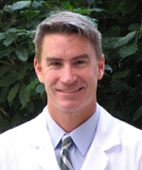
- Dr. Frederick (Fritz) C. Eilber,
- Associate Professor of Surgery,
- Associate Professor of Molecular & Medical Pharmacology,
- Director UCLA – JCCC Sarcoma Program,
- University of California Los Angeles,
- Division of Surgical Oncology,
- 10833 LeConte Avenue, Los Angeles,
- CA 90095-1782, USA.
- BiographyOpen or Close
Frederick (Fritz) C. Eilber, M.D. is an Associate Professor of Surgery, Division of Surgical Oncology with a dual appointment in the Department of Molecular and Medical Pharmacology at the University of California Los Angeles (UCLA). He is director of the UCLA Sarcoma Clinical/ Translational Research Program within the Jonsson Comprehensive Cancer Center. Dr. Eilber obtained his Bachelor of Science (Biology, Anthropology) from University of Pennsylvania in 1989. He got his Doctor of Medicine from University of California Los Angeles in 1995. He has published more than 53 peer-reviewed research articles in top bio-medical journals.
- ExpertiseOpen or Close
Frederick (Fritz) C. Eilber research is focused on translating molecular oncology from the laboratory to the clinic in a rapid and clinically relevant manner with the long-term objective of developing targeted and individualized therapeutic strategies for patients with sarcoma.
- CertificateOpen or Close
- PublicationsOpen or Close
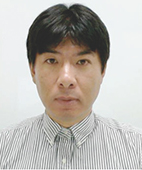
- Dr. Tamotsu Tsukahara,
- Associate Professor,
- Nagasaki University,
- Graduate School of Pharmaceutical Sciences,
- Nagasaki,
- Japan.
- BiographyOpen or Close
Dr. Tamotsu Tsukahara is an Associate Professor of Pharmaceutical Sciences at Nagasaki University. He received his Ph.D. degree from the Department of Biomembrane and Biofunctional Chemistry, Graduate School of Pharmaceutical Science, Japan in 2002. He did his post-doctoral fellow in the Department of Physiology at University of Tennessee Health Science Center, USA (2008-2013). Dr. Tsukahara worked as an Assistant Professor in the Department of Physiology, Shinshu University School of Medicine, Japan. Dr. Tsukaharas' Society Memberships are Japanese Society for Ceramides; Japan Society for Lipid Nutrition; The Japanese Biochemical Society; The Japanese Conference on the Biochemistry of Lipids; American Heart Association (AHA).
- ExpertiseOpen or Close
Dr. Tamotsu Tsukaharas' research interest is characterization of novel lipid molecule that target PPARγ for the treatment of plaque-related diseases such as atherosclerosis, high blood pressure and coronary artery disease. The major goal of this research is to discover antagonist of PPARγ and its characterization that inhibit foam cell and neointima formation.
- CertificateOpen or Close
- PublicationsOpen or Close
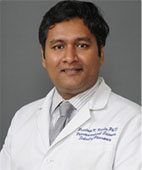
- Dr. Pradeep K. Karla,
- Associate Professor,
- Department of Pharmaceutical Sciences ,
- College of Pharmacy,
- Howard University,
- Washington DC 20059,
- USA.
- BiographyOpen or Close
Dr. Pradeep Karla is an Associate Professor in the College of Pharmacy, Howard University. He obtained his PhD in Pharmaceutics and Drug Design from the University of Missouri-Kansas City, USA. He completed his M.S in Pharmaceutics and Drug Design from the University of Missouri-Kansas City. Dr. Karla graduated 3 Ph.D. students and mentored 3 Post-Doctoral Fellows so far. Dr. Karla is the recipient of AACP New Investigator Grant, NIH K12 Grant and several other financial grant awards.
- ExpertiseOpen or Close
Dr. Karla's research involves in the discovery of new drug efflux transporters on human ocular tissue, Cornea, which forms the primary barrier for topical ocular drug delivery. Dr. Karla's research have demonstrated for the first time that these transporters play a vital role in decreased ocular bioavailability of drugs employed in chronic disease states such as glaucoma and ocular herpes. Current research in his laboratory involves the screening of wide array of ocular for substrate specificity of the multiple new drug efflux transporters and testing of nano-encapsulation / pro-drug strategies as drug delivery options for improved bioavailability. Dr. Karla's research has been cited by American Association of Colleges of Pharmacy (AACP) as one of the eight outstanding research contributions that have the potential for a therapeutic cure for glaucoma.Dr. Karla's laboratory is also working on developing a microbicidal nano-gel drug delivery strategy to prevent the transmission of HIV.
- CertificateOpen or Close
- PublicationsOpen or Close
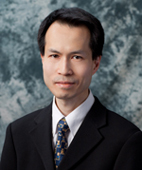
- Dr. To Kenneth Kin Wah,
- Associate Professor,
- School of Pharmacy,
- The Chinese University of Hong Kong,
- Shatin, N.T., Hong Kong,
- The People's Republic of China,
- BiographyOpen or Close
Dr. To Kenneth Kin Wah is an Associate Professor at the School of Pharmacy, The Chinese University of Hong Kong, Hong Kong. He is also a registered pharmacist in Hong Kong. He obtained post-doctoral research training in cancer research in the United States. He had studied multidrug resistance transporters and cancer epigenetics at the National Cancer Institute (NCI/NIH). Currently, his research group is devoted to cancer cell biology and drug transporter research. The goal is to develop novel strategies for eradicating cancer cells and to devise more specific prognostic biomarkers for predicting response to chemotherapy. They demonstrated the novel use of molecular targeted tyrosine kinase inhibitors in eradicating cancer stem-like cells and circumventing transporters-mediated chemo-resistance. Besides, the group studied the microRNA-mediated regulation of drug transporters and its prognostic application in predicting response to chemotherapy.
- ExpertiseOpen or Close
Dr. To Kenneth Kin Wah’s research interest includes Epigenetic regulation of drug transporters; Combination use of molecularly targeted tyrosine kinase inhibitors with other conventional anticancer drugs to overcome multidrug resistance; Adjuvant use of active constituents from traditional Chinese medicine in circumventing resistance to conventional anticancer drugs; Design of novel Platinum-based anticancer agents
- CertificateOpen or Close
- PublicationsOpen or Close

- Dr. Lingtak-Neander Chan,
- Associate Professor,
- School of Pharmacy,
- Interdisciplinary Faculty,
- Graduate Program in Nutritional Sciences,
- University of Washington,
- Seattle, WA 98195, USA.
- BiographyOpen or Close
Dr. Lingtak-Neander Chan, PharmD, BCNSP, is an Associate Professor of Pharmacy and Interdisciplinary Faculty in Nutritional Sciences at the University of Washington. His primary research focus is on the absorption kinetics of micronutrients and drugs after bariatric surgery and other GI tract repairs. Previously, he was a Clinical Assistant Professor of Pharmacy and Medicine at the University of Illinois at Chicago, specializing in pulmonary /critical care and clinical nutrition, where he also served as the leader of the Clinical Nutrition Support Team at the University of Illinois Medical Center. He is also a very active A.S.P.E.N. member and has served as the Chair of a number of A.S.P.E.N. committees. In addition to being extensively involved in the didactic curricula, he has also mentored a large number of students, residents, fellows, and graduate students in both Pharmacy and Dietetics.
- ExpertiseOpen or Close
Dr. Lingtak-Neander Chan’s areas of interest include the medical and nutritional management of critically ill patients and patients who are at risk for nutritional deficiency, specifically in patients who are critically ill, obese, or have undergone extensive GI tract surgery.
- CertificateOpen or Close
- PublicationsOpen or Close
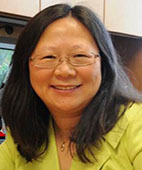
- Dr. Tao L. Lowe,
- Associate Professor,
- Department of Pharmaceutical Sciences &Biomedical Engineering,
- University of Tennessee Health Science Center,
- Memphis, TN 38163,
- USA.
- BiographyOpen or Close
Dr. Tao Lowe is currently an Associate Professor of Pharmaceutical Sciences and Biomedical Engineering at University of Tennessee Health Science Center and Co-Director of the Integrated Graduate Degree Molecular Toxicology Program at Pennsylvania State University. She received her Ph.D. with an Eximia Cum Laude from the University of Helsinki, Finland. She conducted two years’ postdoctoral research in the Department of Chemical Engineering at University of Wisconsin, Madison. Dr. Lowe’s research activities include design and development of multi-functional biomaterials for targeted and sustained drug and gene delivery, regenerative medicine, and biosensoring for the diagnoses and treatments of brain and eye diseases, cancers, bone fractures, and cartilage damages, and as well as contraception. She has published many high impact peer-reviewed papers, has been awarded US patents, and has lectured extensively throughout the global scientific community. She has received funding support from NIH, DOD, Coulter Foundation, JDRF, and FHI360/Bill & Melinda Gates Foundation, etc. Dr. Lowe has trained 60 students including PhD, MD, MD/PhD, PharmD, and PharmD/PhD. Her research activities have been recognized in the Royal Society of Chemistry's magazine, Chemistry in Britain, the Research Penn State Magazine, and via the press release of ARVO. Dr. Lowe is a peer reviewer for over 40 refereed journals, and editorial board member for 12 international journals. She is a frequent grant reviewer for NIH, NSF, DOD, EPA, USED, NSERC, ETHZ, etc. She has serviced on the committees of AAPS, ARVO, AIChE, CRS, BMES, SFB, etc. She was the 2010 Chair of the AIChE Biomaterials Area and is currently the Chair of the AAPS Nanotechnology Focus Group. Dr. Lowe has achieved numerous honors and awards including Early Career Award in Translational Research from the Coulter Foundation.She has published many high impact peer-reviewed papers, has been awarded US patents,and has lectured extensively throughout the global scientific community.
- ExpertiseOpen or Close
Dr. Lowe’s research is focused on biomaterials for translational research featuring innovative nanotechnology, drug and gene delivery, regenerative medicine, precision medicine, neural engineering, stem cell engineering, contraception, and biosensoring. The research activities in her lab include rational design and synthesis of multi-stimuli-responsive polymeric biomaterials in the forms of nanogels, branched nanoparticles, hydrogels and thin films; characterizations of the mechanisms by which these designed biomaterials regulate targeted and sustained delivery of drugs, proteins and genes, and promote cell growth; and in vitro and in vivo studies of the bioefficacy of these biomaterials. The developed biomaterials have great potential in providing exquisitely sensitive, selective, non-toxic, biodegradable and responsive platforms to target therapeutic agents to the sites of ocular, central nervous, cancerous, and musculoskeletal lesions.
- CertificateOpen or Close
- PublicationsOpen or Close
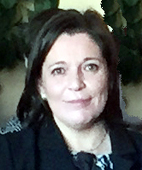
- Dr. Carmen Vale Glez,
- Associate Professor,
- Department of Pharmacology,
- School of Veterinary Medicine,
- Campus Universitario s/n,
- 27002 Lugo,
- Spain.
- BiographyOpen or Close
Dr. Carmen Vale Glez is an Associate Professor in the Department of Pharmacology, School of Veterinary Medicine, Campus Universitario S/N, 27002 Lugo, Spain. Dr. Glez earned her Ph.D in Pharmacy, University of Barcelona in 1992. She was a Postdoctoral Fellow at the Center for Neural Science, New York University from 1998 to 1999. She was an Associate Professor, School of Medicine, University of Castilla-La Mancha from 1999 to 2004. Dr. Glez has published more than 50 scientific publications.
- ExpertiseOpen or Close
Dr. Carmen Vale Glez’s research interest include Alzheimer´s Disease, neuropathology, neurophisiology and in vitro models for Alzheimers disease, amyloid beta and tau, neuronal cultures, human T lymphocytes physiology, Acetylcholine, GABA, glutamate, oxidative stress, electrophysiology, marine phycotoxins, ion channels, neuronal plasticity, plasticidad sináptica, synaptic homeostasis.
- CertificateOpen or Close
- PublicationsOpen or Close
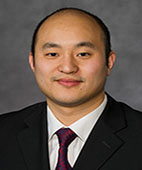
- Dr. Yang Zhang,
- Associate Professor,
- Department of Pharmacological & Pharmaceutical Sciences,
- College of Pharmacy,
- University of Houston,
- Houston, TX 77204-5056,
- USA.
- BiographyOpen or Close
Dr.Zhang is an Associate Professor in the Department of Pharmacological and Pharmaceutical Sciences, College of Pharmacy, University of Houston, Houston, Texas. He earned his Ph.D. in cardiovascular pharmacology from Medical College of Wisconsin in Milwaukee, Wisconsin. He completed his postdoctoral fellowship and then became a junior professor at the School of Medicine, University of Duisburg-Essen, Essen, Germany (2006-2011). He worked as an Assistant Professor in the Department of Pharmacology, School of Medicine, Virginia Commonwealth University, Richmond, Virginia (2011-2015). Dr. Zhang has published more than 60 peer-reviewed journal articles and book chapters. Dr.Zhang is the recipient of several grants from the National Institute of Health (NIH).
- ExpertiseOpen or Close
Dr. Zhang major goal of research is to investigate the molecular and immunological mechanisms implicating in the initiation of chronic cardiovascular diseases such as atherosclerosis and hypertension. Dr. Zhang particularly interested in exploring the molecular mechanisms regulating lysosome trafficking and autophagy associated with ceramide and redox signaling as well as the control of cell differentiation and dedifferentiation during atherogenesis;and the pathogenic role of inflammasomes in vascular injury and fibrosis including the recruitment and activation of immune or inflammatory cells, the uncanonical roles in tissue injury and repair, and the signaling of intracellular RNA receptors in determining the susceptibility to degenerative vascular injury during repeated viral infections such as cold, flu or herpes attacks.
- CertificateOpen or Close
- PublicationsOpen or Close
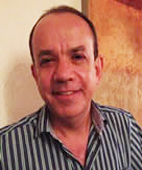
- Dr. Carlos Alberto Tagliati,
- Associate Professor of Toxicology,
- Faculty of Pharmacy,
- Department of Clinical and Toxicological Analysis,
- Federal University of Minas Gerais,
- Antônio Carlos , 6627 , Pampulha,
- Brazil.
- BiographyOpen or Close
Dr. Carlos Alberto Tagliati is a Professor of Toxicology in the School of Pharmacy, Federal University of Minas Gerais, Brazil. He received his doctorate in Drugs and Medicines (1997), from the University of São Paulo. He completed his master's degree in Toxicology and Toxicological Analysis (1992), and post-doctorate in Toxicology In Vitro (2006) from the Universidad de Murcia (Spain). He Participated in the creation of the Brazilian Society of Alternative Methods for Animal Experimentation and Member of the Working Group of preclinical studies of IPD-Farma. He published many articles in national and international journals in the field of Toxicology. Author of book chapters in the areas of in vivo and in vitro Toxicology. Project Coordinator in the area of in vivo and in vitro Toxicity. He received "Innovation" Award for Coordinator of Transfer and Innovation/UFMG.
- ExpertiseOpen or Close
Dr. Carlos Alberto Tagliati research interest includes Preclinical toxicity (in vitro and in vivo), nephrotoxicity and toxicokinetics, Pharmacokinetics and Bioavailability.
- CertificateOpen or Close
- PublicationsOpen or Close
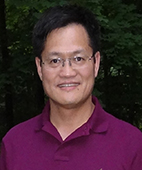
- Dr. Hanting Zhang,
- Associate Professor ,
- Departments of Behavioral Medicine & Psychiatry,
- Departments of Physiology & Pharmacology,
- West Virginia University Health Sciences Center,
- Morgantown, WV 26506-9137,
- USA.
- BiographyOpen or Close
Han-Ting Zhang is a tenured Associate Professor of Pharmacology at West Virginia University and Adjunct Professor at Taishan Medical University in China. He received his BSc/MD at Southern Medical University (formerly the First Military Medical University) and MS and PhD in Neuropharmacology at Beijing Institute of Pharmacology and Toxicology, China. Dr. Zhang had the postdoctoral training at Louisiana State University Health Sciences Center in Shreveport, LA and University of Tennessee Health Science Center in Memphis, TN, USA. Dr. Zhang was awarded twice NARSAD Young Investigator Award (2006 and 2008). Dr. Zhang is an internationally recognized neuropharmacologist. He has a broad background in pharmacology and neuroscience, with specific training and expertise in behavioral and neurochemical analyses. Dr. Zhang has published over 70 peer-reviewed papers.
- ExpertiseOpen or Close
Dr. Han-Ting Zhang’s major research interests focus on signal transduction involved in neurodegenerative and neuropsychiatric disorders. Specifically, he studies the roles of phosphodiesterases (PDEs)-mediated cAMP/cGMP signaling in the mediation of depression, anxiety, alcohol dependence, drug abuse, and memory loss associated with neurodegenerative disorders such as Alzheimer’s disease. Using mice deficient in a specific PDE4 subtype (PDE4A, PDE4B, or PDE4D), Dr. Zhang has demonstrated that PDE4A, PDE4B, and PDE4D differentially mediate anxiety, depression, alcoholism, and cognition impairment in Alzheimer’s disease. Using RNA interference such as microRNAs (shRNAs), Dr. Zhang also has found that long-form PDE4D isoforms play a particular role in antidepressant activity and memory. Most recently, Dr. Zhang has demonstrated for the first time that PDE4 is an important regulator of alcohol consumption and alcohol seeking behavior.
- CertificateOpen or Close
- PublicationsOpen or Close
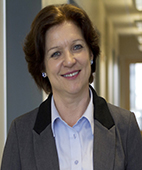
- Dr. Elena V. Batrakova,
- Associate Professor,
- Center for Nanotechnology in Drug Delivery,
- Division of Molecular Pharmaceutics,
- Eshelman School of Pharmacy,
- University of North Carolina at Chapel Hill,
- Chapel Hill, NC 27599-7362,
- USA.
- BiographyOpen or Close
Dr. Elena V. Batrakova is an Associate Professor of Pharmaceutical Sciences at the University of North Carolina at Chapel Hill, USA. She was graduated with M.S. degree in chemistry from M.V. Lomonosov Moscow State University (MSU) in 1983. She obtained Ph.D. in Polymer chemistry at the Department of Polymers, MSU, Russia (1987). The main focus of Dr. Batrakova’s group investigations is on the development of personalized drug delivery systems by loading therapeutics into living cells or exosomes released from these cells. They are taking advantage of white blood cells, monocytes and macrophages that can move toward an inflammation site, cross the blood-brain barrier, and release the preloaded drugs in the brain. Her group demonstrated that these “Trojan Horses” can attenuate inflammation and produce neuroprotection in mouse models of Parkinson’s disease. Several years ago, her interests expanded to the development of a novel class of vectors, genetically modified macrophages, which carry reporter and therapeutic genes to neural cells. These cells can accomplish ‘horizontal gene transfer” to the inflamed tissues, in particular to the brain. The separate investigations in her lab aim to use exosomes released from macrophages as drug delivery vehicles to treat pulmonary metastases and brain disorders. Overall, her group has published 87 papers and filed 20 US and foreign patents on the application of drug delivery systems of biologically active molecules. She have 8,259 unique citations with h-index: 45, and i10-index 66.
- ExpertiseOpen or Close
Dr. Elena V. Batrakova research interests are development of cell-mediated drug delivery systems to attenuate neuroinflammation and produce neuroprotection in patients with PD, using macrophages as a secondary transfection agents for gene delivery to the brain, development of exosome-based drug delivery systems for treatment of pulmonary metastases, development of polymer-based drug delivery systems for the chemotherapy and brain disorders.
- CertificateOpen or Close
- PublicationsOpen or Close
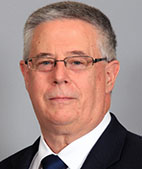
- Dr. Paul Holder,
- Assistant Professor,
- Irma Lerma Rangel College of Pharmacy,
- Texas A&M Health Science Center,
- The University of Texas at Austin,
- USA.
- BiographyOpen or Close
Dr. E. Paul Holder currently serves as Assistant Professor of Pharmacy Practice at the Texas A&M Health Science Center College of Pharmacy. He received his undergraduate and doctoral degrees in Pharmacy from The University of Texas at Austin/The University of Texas Health Science Center at San Antonio. He completed a post-doctoral specialty residency in Drug Information Pharmacy Practice at Scott and White Memorial Hospital in Temple, Texas. Dr. Holder also holds undergraduate and graduate degrees in Chemistry/Mathematics and Physical Chemistry. He served for over 10 years as Assistant Director of Enforcement for the Texas State Board of Pharmacy focusing on USP Chapter 797 and sterile compounding. He currently serves as a member of a Task Force for Pharmacy Technician Certification Board (PTCB) Sterile Compounding Advanced Credentialing. Dr. Holder has authored or co-authored more than 60 United States Patents, scientific, medical, and pharmacy-related publications, book reviews, and a textbook chapter on sterile compounding. He has served as an item writer for the National Association of Boards of Pharmacy NAPLEX and MPJE pharmacist licensing examinations in the United States.
- ExpertiseOpen or Close
Dr. E. Paul Holder Research interest includes International, Federal, and State Pharmacy Law, Preceptor Education, International Comparative Pharmacy Education,Infectious Diseases.
- CertificateOpen or Close
- PublicationsOpen or Close
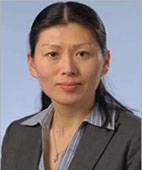
- Dr. Tao Lu,
- Assistant Professor,
- Department of Pharmacology and Toxicology,
- IU Simon Cancer Center,
- Indiana University School of Medicine,
- Indianapolis, IN,
- USA.
- BiographyOpen or Close
Dr. Tao Lu is an Assistant Professor in the Department of Pharmacology & Toxicology, IU Simon Cancer Center, Indiana University School of Medicine. She received her Ph.D. degree in Molecular and Cellular Biology from the University of Toledo School of Medicine Toledo, Ohio (2001). She completed her MS in Biochemistry and Molecular Biology from Shandong University School of Medicine, Shandong, China (1994). She was a Research Associate in Molecular Genetics at Cleveland Clinic, Cleveland, OH, (2003-2005). Dr. Tao Lu has received many honours and awards.
- ExpertiseOpen or Close
The research in Tao Lu lab centres on the multi-functional transcription factor nuclear factor κB (NFκB). Activation of NFκB, a central coordinator of immune responses, is tightly regulated in order to achieve its normal transient activation in response to stress. In some cancers, NFκB is activated abnormally, contributing to oncogenesis and tumour progression. Manipulating NFκB activity therefore, could be critical in the treatment of some subtypes of cancer. At molecular level, Tao Lu is interested in finding novel post-translational modification sites of NFκB, and studying how these modifications can modulate NFκB activity, gene regulation, as well as the downstream biological consequences. As a hallmark in many cancers and a key link between inflammation and cancer, the pivotal transcription factor NFκB is a “hot” target for disease treatment. Ultimately, her studies may provide a rational basis for the design of new strategies for treating NFκB-activated cancers and inflammatory disorders. Moreover, VBIM has been validated extensively as a powerful tool for gene discovery that could have broad applications in many different systems.
- CertificateOpen or Close
- PublicationsOpen or Close
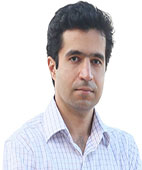
- Dr. Sam Kosari,
- Assistant professor,
- Department of pharmacy,
- University of Canberra,
- Canberra, ACT,
- Australia.
- BiographyOpen or Close
Dr. Sam Kosari is an assistant professor of pharmacy at the University of Canberra and an accredited pharmacist. He received his PhD in Neuropharmacology from RMIT University (2009-2012). Sam has been involved in different aspects of pharmacy practice including community pharmacy, aged care services, pharmacotherapy, chronic diseases and medication review. He has research experience as a postdoctoral fellow at the University of Melbourne in neurophysiology and neuropharmacology research. Sam has 8 years clinical experience in geriatrics as a consultant pharmacist and has conducted medication review and quality use of medicine projects in collaboration with many aged care facilities.He has conducted research and published in areas such as pharmacy practice, geriatric medicines, gastrointestinal drugs, energy metabolism in obesity, autonomic nervous system and sympathetic nerve activity regulation.
- ExpertiseOpen or Close
Dr. Sam research interest includes neuropharmacology, autonomic nervous system, geriatric pharmacology, pharmacy practice and dementia.
- CertificateOpen or Close
- PublicationsOpen or Close

- Dr. Sihem Bihorel, Assistant Professor,
- Center for Pharmacometrics and Systems Pharmacology at Lake Nona,
- Department of Pharmaceutics,
- University of Florida,
- Orlando, Florida 32827,
- USA.
- BiographyOpen or Close
Dr. Sihem Ait-Oudhia is an assistant professor in the department of Pharmaceutics at the College of Pharmacy, University of Florida. She earned her Ph.D from SUNY at Buffalo, New York, USA and the School of Pharmaceutical and Biological Sciences, René Descartes University, Paris, France (2007-2010). She did her Pharm.D from School of Pharmaceutical and Biological Sciences, Rene Descartes University, Paris, France (2000-2006). She completed her Master of Science in Pharmacokinetics and Biopharmacy (DESS) from School of Pharmaceutical and Biological sciences, René Descartes University, Paris, France and Sanofi aventis Research and development. Paris, France (2005-2006). Dr. Sihem Ait-Oudhia has received many honours and awards and serving on the editorial board of many journals.
- ExpertiseOpen or Close
Dr. Sihem Ait-Oudhia research interest is in immuno-oncology in the areas of pharmacokinetic and pharmacodynamic (PK/PD) modeling and simulation, quantitative systems pharmacology (QSP), population modeling, -omics, large molecule therapeutics (proteins, monoclonal antibodies), targeted therapeutics, and liposomes. Dr. Ait-Oudhia utilizes QSP to guide the development of new therapies and the identification of promizing combination therapies as well as of novel biomarkers in oncology. She integrates QSP with PK/PD modeling and simulation to advance drug discovery and development, and leverage the understanding of drugs action and toxicity which holds great promise to facilitate translational research. She also investigates how priming solid tumors with a pro-apoptotic agent then combining a subsequent immunotherapeutic can defeat drug resistance in cancer and further enhance the efficacy of targeted anticancer agents, and translating these findings toward clinical settings.
- CertificateOpen or Close
- PublicationsOpen or Close
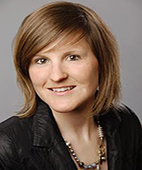
- Dr. Mirjam Nadine Trame, Assistant Professor,
- Center for Pharmacometrics & Systems Pharmacology,
- Department of Pharmaceutics,
- College of Pharmacy,
- University of Florida,,
- Orlando, USA.
- BiographyOpen or Close
Dr. Mirjam N. Trame is an Assistant Professor at the University of Florida in Center for Pharmacometrics and Systems Pharmacology in Lake Nona (Orlando) . She in addition holds an Adjunct Faculty appointment at the Translational Research Institute for Metabolism and Diabetes at Florida Hospital, Orlando. Dr. Trame received her B.S. in Pharmaceutical Sciences from the Westfälische-Wilhelms Universität in Münster, Germany (2006). She earned her Pharm.D. degree from the University of Florida in 2010 and her Ph.D. in Clinical Pharmacology and Pharmacokinetic-Pharmacodynamic (PK/PD) modeling from the Westfälische-Wilhelms Universität in Münster, Germany (2011) . After she received her Ph.D., she completed a 2 year postdoctoral fellowship under the supervision of Prof. Mats Karlsson and Prof. Lena Friberg in the Pharmacometrics Research Group at Uppsala University in Sweden. She has published various research papers and wrote a book chapter.
- ExpertiseOpen or Close
Dr. Mirjam N. Trame research focuses on the application of quantitative analysis tools (pharmacometrics, PBPK and systems pharmacology) to address clinically relevant research questions in the area of diabetes, obesity, energy expenditure modeling in different diseases, antithrombotic therapy, neurodegenerative diseases, rare diseases, drug induced nephrotoxicity, pediatrics, cardiovascular and drug safety, cystic fibrosis, and translational research, PK/PD modeling and simulation of Therapeutic Drug Monitoring (TDM) data in various disease areas (i.e. Anticoagulation, HIV, COPD).
- CertificateOpen or Close
- PublicationsOpen or Close




